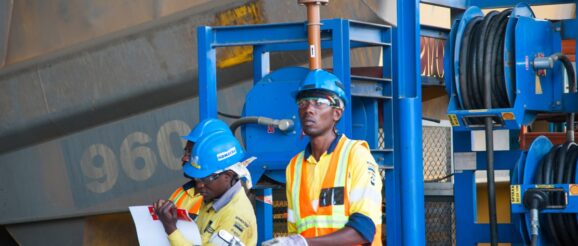Zambia’s largest mine credits ‘a culture of innovation’ among its staff for its efficiency – PAN AFRICAN VISIONS

SOLWEZI, ZAMBIA – Zambia’s mining sector has faced significant challenges over the last decade due in part to fluctuating commodity prices, unstable taxes and most recently, the outbreak of COVID-19.
Despite the many obstacles in the sector however, the country’s biggest mine and taxpayer – First Quantum Minerals (FQM) – has managed to not only remain viable but also increase production.
Part of what has helped sustain the mine through the hardships is its insistence in making innovation a critical pillar of its operations, a particularly important factor given low ore grades, accompanying low margins, and the need for efficiency and economies of scale to maintain profitability.
“We believe that innovation is an unreplaceable buffer against several challenges both at the sectoral and economic level,” said Country Manager General Kingsley Chinkuli.
“Beyond this, innovation – to a mine as focused on longevity as FQM is – represents a critical pillar in its operational strategy, which must be maintained through the generations of miners who flow through the mine. Therefore, we make cultivating an innovative culture among our staff a top priority at both our Kansanshi and Sentinel mines.”
General Chinkuli said that it was the mine’s goal to ensure each member of the FQM family was capable of making significant contributions to the creation of pioneering solutions to challenges prevalent in the mining sector.
“One thing that has worked well for us at First Quantum Minerals is thinking ahead,” he said.
“Thinking ahead, most of the time, involves anticipating potential problems and coming up with solutions that may not yet be available at that time – and this requires a certain level of inventiveness to pull off.”
Driving the current wave of innovation is data, providing actionable insights through effective and relevant tools and technology, explains FQMO Project Manager Colin Du Plessis.
The high-tech Kansanshi Mine is coordinated through sophisticated online management information systems enabling geology, mining and process teams to access accurate data for meaningful decision-making across different departments.
One of the most progressive in-house innovations at the mine is the introduction of the Wenco High Precision Loading system, which provides precise details on loaders’ positions on site, with every bucket being monitored and compared against published geological parameters.
“By accurately tracking operator performance and positioning data, we are able to identify inefficiencies among operators,” explains FQMO Optimisation Manager Ziggy Gangaidzo.
“This way, management can prepare specific training programmes for affected personnel to avoid mild operational inefficiencies growing into serious bottlenecks that would affect the mine’s overall productivity.”
Meanwhile, the Wenco Readyline data system has improved machine reliability and avoid catastrophic failures by analysing the relationship between truck payloads and component failures in real-time.
And so accurate is the mine’s computerised payload monitoring that it has further improve productivity and reconciliation, while ensuring truck chassis are maintained within design parameters; crucial given that each truck is worth US$ 3.5 million.
Thanks in part to such innovation, FQM’s Sentinel mine last year recorded a 9 percent year-on-year growth in copper production.
FQM believes that if innovation could be prioritised in all sectors of the economy, Zambia would have the tools necessary to be well on its way to becoming a middle-income country by 2030, in-line with its economic goals.
Innovation is the most sustainable way of growing a country’s economy. And if Zambia is to successfully transition from a mineral dependent economy and bring non-traditional sectors to the fore, in its push for economic diversity; there is hardly a better platform to build on than the spirit of innovation.
“If we as a country could focus on innovation, especially in terms of adding value to our natural resources, then we would be that much closer to achieving not only the industrialisation dream but also the long sort after economic diversity,” said Gen. Chinkuli.
“While copper prices may be booming at present, let us for one moment imagine how Zambia would sustain its GDP without the red metal. Let us pretend Zambia was not so richly endowed with natural resources; how would we keep her economy alive if not through innovation?
“Hence why we must start inculcating a culture of innovation in our people now, while we still have minerals to fall back on. Let us follow FQM’s example and make thinking outside the box common place in all sectors of the economy so that we may thrive beyond our mines’ lifespans and even in the face of global adversities,” he said.
About First Quantum Minerals Ltd
First Quantum Minerals Ltd is a global metals and mining company producing mainly copper, gold and zinc. The company’s assets are in Zambia, Spain, Mauritania, Australia, Finland, Turkey, Panama, Argentina and Peru.
In 2020, First Quantum globally produced 779,000 tonnes of copper, 265,000 ounces of gold and 13,000 tonnes of nickel.
In Zambia it operates the Kansanshi mine – the largest copper mine in Africa by production – and smelter and the Sentinel mine in Kalumbila.
The company is listed on the Lusaka and Toronto stock exchanges
